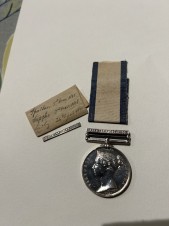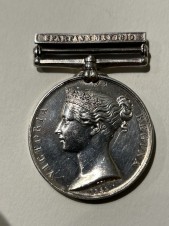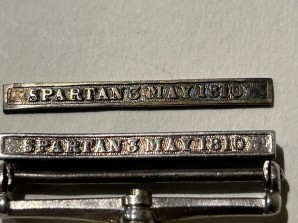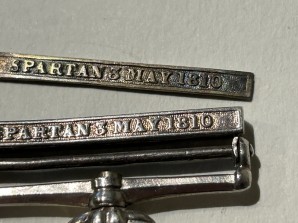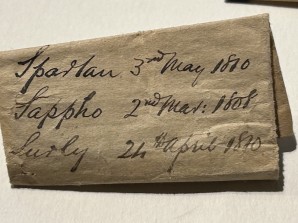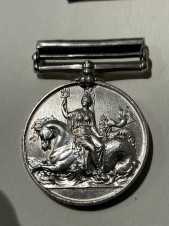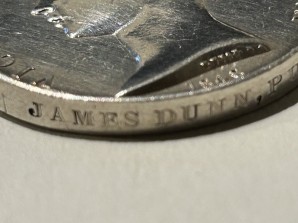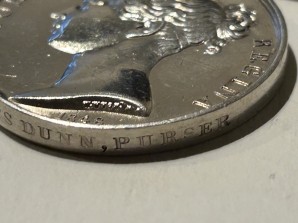REDUCED ! NAVAL GENERAL SERVICE MEDAL 1793, CLASP SPARTAN 3 MAY 1810; ‘JAMES DUNN, PURSER.’
Stock No. 132563
Product Information
Out of Stock
THE SUPERB NAVAL GENERAL SERVICE MEDAL 1793 CLASP: SPARTAN 3rd MAY 1810, TO AN OFFICER MENTIONED IN DESPATCHES FOR HIS GALLANTRY WHILST IN CHARGE OF GUNS ON THE MAIN DECK DURING THE CELEBRATED GOLD MEDAL ACTION IN THE BAY OF NAPLES, LEAVING AN ACCOUNT OF THE ACTION WRITTEN LESS THAN TWO WEEKS LATER. PREVIOUS TO THIS HE WAS WOUNDED IN A BOAT ACTION AND TOOK PART IN SEVERAL OTHER GALLANT AFFAIRS IN THE ADRIATIC AND OFF THE AMERICAN COAST 1812-13
Condition GVF: NOTE THIS MEDAL WAS PREVIOUSLY DESCRIBED AS HAVING BEEN FITTED WITH A COPY CLASP HOWEVER THIS IS TOTALLY INCORRECT AND THE CLASP IS CORRECT IN EVERY WAY.
WHEN I PURCHASED THE MEDAL I PROCURED AN ORIGINAL SPARTAN CLASP FROM CHRIS DIXON STILL WRAPPED IN ITS PERIOD TISSUE PAPER. ON EXAMINATION THE ADDITION CLASP I PURCHASED IS IDENTICAL IN EACH AND EVERY WAY . I SHOWED THE MEDAL AND 2 CLASPS TO DNW ON A VISIT THERE AND THEY CONCURRED THAT THIS WAS ORIGINAL . THE ADDITIONAL SPARTAN CLASP IS INCLUDED IN THIS SALE BEING PART OF ITS HISTORY.
Provenance: Glendinning’s Auction June 1904, and again July 1962, and in both sales the
description of his clasp states at as ‘unofficial clasp’.
appointed to the newly launched 38 gun frigate H.M.S Spartan on 12th August 1806, under
Captain George Astle at Spithead. The famed Captain Jahleel Brenton, took over Spartan’s
Command in February 1807. Initially serving in the Mediterranean, for a time Spartan cruised
with Lord Cochrane’s Imperieuse, the two ships with their like minded Captain’s, causing a
great deal of mischief upon the enemy. Dunn remaining on Spartan right up until July 1814,
therefore taking part in a great many actions. However it was for the action in which Spartan
alone, took on a Franco-Neapolitan squadron in the Bay of Naples, capturing one prize and
severely damaging two others;
‘In October 1809 the Spartan was part of the force engaged in the reduction of the Ionian
Isles, and in May 1810, whilst cruising in company with the Success, of 32 guns, and the
Espoir brig, chased a small French squadron into Naples. This consisted of the Ceres frigate
of the same force as the Spartan, though with about one-fourth more men, the Fama frigate of
28 guns, a brig, a cutter, and seven gunboats. Captain Jahleel Brenton, of the Spartan, feeling
certain that the French ships would not come out in the face of two frigates, despatched the
Success to the southward, and on the morning of 3 May stood back towards Naples, hoping to
tempt the enemy to come out. They had anticipated his wish, and having taken on board some
400 soldiers, in addition to their already large complements, met the Spartan in the very
entrance of the bay, about midway between Ischia and Capri. The action that ensued was
extremely bloody, for the Spartan’s broadsides told with terrible effect on the crowded decks
of the Ceres and her consorts, while on the other hand the heavy fire of the gunboats inflicted
severe loss on the Spartan. Brenton himself was badly wounded in the hip by a grapeshot, and
during the latter part of the fight the Spartan was commanded by her first-lieutenant, Willes.
The brig was captured, but, the Spartan’s rigging being much cut, the Fama was towed away
by gunboats, preventing its capture and Ceres succeeded in getting under some batteries in
Baia Bay. For his gallant and skilful conduct of the action Willes was deservedly promoted;
and Captain Brenton’s bravery, his tactical skill, and the severity of his wound won for him
sympathy and admiration which forgot to remark on his mistaken judgement in sending the
Success away mistaken, for the resolve of the enemy to come out was formed quite
independently of the Success’s absence. The Patriotic Fund at Lloyd’s voted him a sword,
value one hundred guineas; the king of the Two Sicilies presented him with the Grand Cross
of St. Ferdinand; he was made a baronet in November 1812, and a K.C.B. in January 1815.’
Dunn was mentioned in Despatches (LG 1810) for his gallant and distinguished service
during this action; the following from Captain Brenton’s original dispatch:
‘..Nor most I forget Mr. Dunn, the purser, who took charge of a division of guns on the main
deck in the place of the officer, absent in a prize with eighteen men, (which reduced our
number to two hundred and fifty eight at the commencement of the action) he displayed the
greatest gallantry.’Dunn is not that unusual, in period accounts and despatches, pursers, Surgeon’s, Carpenters
etc are often to be found playing their part in any ship or boat action, frequently being found
on casualty lists or mentioned for their gallant service. On board ships of the time every man
of every rank or rating would take their turn.
During 1812 – 13, Spartan, now under Command of Captain Edward Pelham Brenton, the
former Captain’s brother was very active on the North American station, capturing a great
many American privateers.
Spartan’s service whilst Dunn was aboard is extensive. However excellent accounts of the
many actions can be found through this link, which includes an extensive report on the battle
in the Bay of Naples:
http://www.pbenyon.plus.com/18-1900/S/04328.html
Another excellent and even more detailed account of Spartan’s service can be found in
‘Memoir of the life and services of Vice-admiral Sir Jahleel Brenton’, a copy of which (on
CD), comes with the medal
A search of Navy lists, Gazettes etc gives the following later partial service;
1815, 1816 doesn’t appear to be attached to a ship
1821 – serving as Secretary to Vice Admiral Benjamin Hallowell KCB, CIC of HM ships at
Chatham
1826 was serving as Secretary to Sir Robert Moorsom at the Nore
1832 – Married Lucy, only daughter of the late Richard Dore, Esq. formerly his Majesty’s
Deputy Judge Advocate of the Colony of New South Wales
1850 – Died 11th October
Dunn’s Navy List entry gives the following:
‘J. Dunn was the Purser of the Spartan, at the taking of the Islands of Ischia and Procida of
four ships under the batteries of Terracino, and several gallant affairs in the Adriatic; in
command of a boat (with a Greek crew), captured a French privateer of four guns, when he
was slightly wounded, and his gallantry was officially mentioned in the Spartan’s hard fought
action with the enemy’s squadron in the Bay of Naples’. His obituary added; ‘and after being
secretary to Commodore Spranger at the taking of the Ionian Islands, he served in the same
capacity to Sir Benjamin H. Carew and Sir Robert Moorson.’
James Dunn, was one of 30 officers and men to subsequently live to claim the Naval General
Service Medal 1793-1840 with clasp for Spartan 3 May 1810. James Dunn is the only Purser
to receive this medal, and with his rank it is uniquely named.
CSold with copy medal rolls gazette, letter, Memoir of the life and services of Vice-admiral Sir
Jahleel Brenton and, some copy despatches 1807-10 and other research on CDDUNN’S PUBLISHED LETTER FROM SPARTAN, DESCRIBING THE FAMED
ACTION
From an Officer to a Fiend in London. – “His Majesty’s ship Spartan, Malta, 16th -May,
1810.
“MY DEAR FRIEND,
Aware that an old Messmate (particularly a once Spartan) will derive some gratification from
the particulars of our recent glorious contest, I willingly avail myself of the first conveyance
to enable you to participate in the feelings of your old shipmates. On the 1st instant, we, in
company with the Success, chased into Naples a frigate, corvette, brig, and cutter. On the 2d,
from a supposition on the part of the truly gallant Captain (Jahleel Brenton) that these fair-
weather birds would never put to sea, whilst menaced by two British frigates, he ordered the
Success (being a junior ship) to part company: the manoeuvre succeeded, and on the
following morning, at day-light, the enemy’s squadron was with pleasure descried standing
towards us, in a regular line of battle. It was not in our nature to run but, agreeably to our
usual system, as well as their astonishment, we made sail for them; and, being aided by a
light breeze, were enabled, about 40 minutes after seven, to commence against “fearful
odds,” what our gallant brother tars on this station, as well as the conquered foe,
acknowledge to have been one of the most brilliant actions ever fought by an English frigate.
The battle took place off Naples, and was commenced within pistol-shot by the French frigate
Ceres, of 42 guns, she being the leading ship of the enemy’s line, and after a truly trying, yet,
thank God, glorious contest of two hours and ten minutes (during which time the awful scene
was witnessed by his Mock-majesty, Murat, and the whole population of the proud city of
Naples, we succeeded in capturing the national brig L’Espervoir, by our brave fellows
gallantly boarding her, in the face of the enemy’s whole force, who were, like unto ourselves,
almost torn to pieces. When we had approached this “host of foes” sufficiently near to be
distinctly heard, we welcomed them with “three cheers,” which was proposed by our gallant
captain, and given by our brave tars with heartfelt sincerity for the honour of our beloved
country and glorious profession. From the officers whom we have taken prisoners, we have
been assured that our cheering tended forcibly to unnerve their seamen, as it taught them to
believe we had, in the first instance, decided on death or victory ! Our loss has been severe—
10 brave fellows killed, and 22 wounded; yet, when I refer you to the annexed unprecedented
superiority to which we were opposed, you must think with me, that those heroic Britons
could never have fallen on a more glorious occasion. Among the killed I have to deplore the
death of that gallant youth, Mr. Robinson, master’s mate, whom you, as an old Spartan, must
recollect; and in the list of wounded, the name of our truly heroic and distinguished captain
unfortunately stands conspicuous. He was dangerously wounded by a grapeshot, about the
middle of the action, whilst fearlessly standing on the capstan, and by his judicious
manoeuvring and gallant example, imbibing a confidence of success in every officer and man
around him. He was wounded in the left side, and has since suffered almost incessant pain
with becoming fortitude; but I am happy to add, he is now pronounced out of danger; and the
ardent prayers of his officers and brave crew continue to be offered up with seaman-like
sincerity for his speedy restoration to the service of his country; with whom his zeal, ability,
and heroism must ever stand unrivalled! and by whom, if genuine merit wants not admirers,
he will, no doubt, be amply rewarded. He has already received the Order of Knighthood and
of Merit, from his Majesty the King of the Two Sicilies, which, no doubt, will be followed on
the part of our good Sovereign (God bless him) by the Order of the Bath, and an adequate
pension to support it. We Have just learned by a flag of truce the enemy’s loss to have been
severe beyond precedent, 154 killed, and 316 wounded.
Yours truly, JAMES DUNN, Purser.ENGLISH force.
Spartan …———–88 Guns 258 Men
FRENCH Force.
Ceres ————– 42 Guns 300 Men
Fame ————– 28 Guns 280 Men
Espervóir ———— 8 Guns 98 Men
Aclailla————-12 Guns 120 Men
7 Gun-boats —7 Guns, with 40 Men each – - – - – -7 Guns 280 Men
Total ————–97 Guns 1078 Men
“The first escaped, the second was dismasted, and the third taken.” The French captain
lost his arm, which may save his life. The action was fought within four miles of Naples, and
three of the batteries of Baia and Procida. When the enemy were within range of grape from
the Spartan, she saluted them with three cheers, which were distinctly heard by the whole
line. On the 25th of May Captain Brenton was considered out of danger. The gallant conduct
in Captain Brenton, and the subsequent chagrin of King Murat, reminds us of the following
anecdote — When Bonaparte and his new Empress were at Boulogne, after viewing the
fortifications, and every thing interesting in the town, they went to the heights to take a peep
at the sea. The Empress had a telescope in her hand, and observing a vessel cruising, at some
distance, she inquired what it was, and was informed that it was an English vessel. Perceiving
five others in the harbour, she asked what they were, and was told that they belonged to the
Emperor. She then asked why the five vessels did not go and take that belonging to the enemy.
At this moment Bonaparte, who had ‘shewn a restless impatience, could restrain his feelings
no longer, but snatching the glass out of her hand, exclaimed, in the French language, with
great impetuosity, “Because the wind is not fair” ..’

